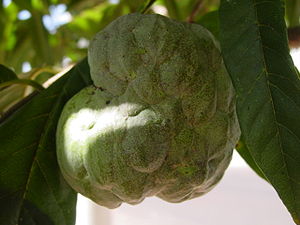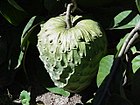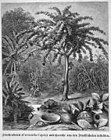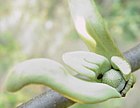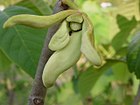Note: This is a project under development. The articles on this wiki are just being initiated and broadly incomplete. You can Help creating new pages.
Annonaceae - Sitaphalam
The Annonaceae are in the custard apple family, of flowering plants consisting of trees, shrubs, or rarely lianas. It is the largest family in the Magnoliales. Several genera produce edible fruit, most notably Annona, Anonidium, Asimina, Rollinia, and Uvaria. Common names custard apple, sugar apple etc.
Contents
- 1 Uses
- 2 Parts Used
- 3 Chemical Composition
- 4 Common names
- 5 Properties
- 6 Habit
- 7 Identification
- 8 List of Ayurvedic medicine in which the herb is used
- 9 Where to get the saplings
- 10 Mode of Propagation
- 11 How to plant/cultivate
- 12 Commonly seen growing in areas
- 13 Photo Gallery
- 14 References
- 15 External Links
Uses
Wounds, Cuts, Snakebites, Curing liver disorders, Skin eruptions, Blotches, Pimples, Diarrhea, Sore throats
Parts Used
Chemical Composition
salzmannii; sesquiterpenes predominated in both essential oils. Bicyclogermacrene (38.0%), (E)-caryophyllene (27.8%), α-copaene (6.9%) and α-humulene (4.0%) were the main components of A. pickelii, while δ-cadinene (22.6%), (E)-caryophyllene (21.4%), α-copaene (13.3%), bicyclogermacrene (11.3%[1]
Common names
| Language | Common name |
|---|---|
| Kannada | seetaphala |
| Hindi | ata |
| Malayalam | seethapazham |
| Tamil | atta |
| Telugu | sita-phalamu |
| Marathi | NA |
| Gujarathi | NA |
| Punjabi | NA |
| Kashmiri | NA |
| Sanskrit | atrupyum |
| English | sugar apple, sweetsop |
Properties
Reference: Dravya - Substance, Rasa - Taste, Guna - Qualities, Veerya - Potency, Vipaka - Post-digesion effect, Karma - Pharmacological activity, Prabhava - Therepeutics.
Dravya
Rasa
Madhura (Sweet)
Guna
Sheeta (Cold)
Veerya
Sheeta (Cold)
Vipaka
Madhura (Sweet)
Karma
Vata, Pitta
Prabhava
Habit
Identification
Leaf
| Kind | Shape | Feature |
|---|---|---|
| Simple | simple leaves with smooth margins that are alternately arranged in two rows along the stems |
Flower
| Type | Size | Color and composition | Stamen | More information |
|---|---|---|---|---|
| Unisexual | 2-4cm long | Yellow | 5-20 | Actinomorphic but zygomorphic in Monodora due to difference in size of petals, hermaphrodite |
Fruit
| Type | Size | Mass | Appearance | Seeds | More information |
|---|---|---|---|---|---|
| simple | 7–10 mm (0.28–0.4 in.) long pome | united to form a single compound fruit (Annona squamosa) | aggregate of berries | many | {{{6}}} |
Other features
List of Ayurvedic medicine in which the herb is used
- Vishatinduka Taila as root juice extract
Where to get the saplings
Mode of Propagation
How to plant/cultivate
Many species and cultivars of Annonaceae have been introduced anf tested in Florida[3]
Commonly seen growing in areas
Tall grasslands, meadows, Borders of forests and fields.
Photo Gallery
References
External Links
- Ayurvedic Herbs known to be helpful to treat Wounds
- Ayurvedic Herbs known to be helpful to treat Cuts
- Ayurvedic Herbs known to be helpful to treat Snakebites
- Ayurvedic Herbs known to be helpful to treat Curing liver disorders
- Ayurvedic Herbs known to be helpful to treat Skin eruptions
- Ayurvedic Herbs known to be helpful to treat Blotches
- Ayurvedic Herbs known to be helpful to treat Pimples
- Ayurvedic Herbs known to be helpful to treat Diarrhea
- Ayurvedic Herbs known to be helpful to treat Sore throats
- Herbs with bark used in medicine
- Herbs with leaves used in medicine
- Herbs with fruits used in medicine
- Herbs with common name in Kannada
- Herbs with common name in Hindi
- Herbs with common name in Malayalam
- Herbs with common name in Tamil
- Herbs with common name in Telugu
- Herbs with common name in Sanskrit
- Herbs with common name in English
- Habit - shrub
- Habit - plant
- Index of Plants which can be propagated by Seeds
- Index of Plants which can be propagated by Cuttings
- Herbs that are commonly seen in the region of Tall grasslands
- Herbs that are commonly seen in the region of meadows
- Herbs that are commonly seen in the region of Borders of forests and fields
- Herbs
